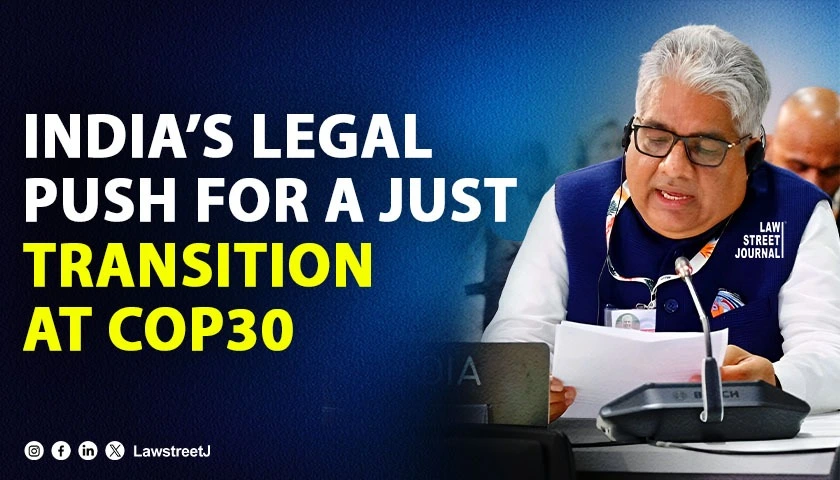New Delhi: India, supported by several developing countries, has formally pressed for the creation of a legally structured “just transition mechanism” at the COP30 Climate Summit in Belém, Brazil. The proposal places climate finance at the center of global adaptation and resilience efforts.
India’s Legal Push for a Just Transition at COP30
During the 30th Conference of the Parties (COP30) to the United Nations Framework Convention on Climate Change (UNFCCC), Environment Minister Bhupender Yadav led the Indian delegation in presenting the country’s position. Speaking at the high-level ministerial roundtable on November 20, 2025, he outlined India’s demand for a mechanism grounded in the principles of Common But Differentiated Responsibilities and Respective Capabilities (CBDR-RC).
India’s proposal seeks a structured framework to support economy-wide shifts from fossil fuels to renewable energy in a manner that safeguards national development goals and livelihoods. The delegation noted that the legal basis for this position stems from Article 4 of the UNFCCC, which establishes differentiated commitments for developed and developing nations.
India underscored that financing for adaptation must be treated as an essential investment. Delegates cited the current gaps in global climate funding and argued that the Just Transition Work Programme launched at COP27 and expanded at COP28 should now integrate employment generation, poverty reduction, food security, and social protection as fundamental pillars of transition planning.
On November 20, Brazilian President Luiz Inácio Lula da Silva held a closed-door meeting with Bhupender Yadav and senior Indian officials, including Lead Negotiator Amandeep Garg. The meeting, which lasted around 20 minutes, focused on a possible roadmap for fossil-fuel phase-out. Both sides discussed how to align energy-security needs with climate targets—an issue President Lula has placed high on his agenda for COP30. According to sources from both delegations, the exchange covered India’s approach to nationally determined transition pathways and touched on the broader global debate over the legal obligations of developed nations to support developing economies through technology transfer and financial resources.
The outcome of these discussions is expected to influence the language of the COP30 declaration, particularly in sections addressing equity, financial commitments, and transition timelines. India’s delegation also pointed to findings from its Third National Communication to the UNFCCC, which identifies sector-specific vulnerabilities and outlines national adaptation strategies. Additionally, India reaffirmed its role in the Leadership Group for Industry Transition (LeadIT 2.0), co-chaired with Sweden, aimed at accelerating decarbonization in sectors such as steel, cement, and heavy manufacturing.
Legal and Financial Implications for Global Climate Governance
India’s call for a legally binding just transition mechanism carries significant implications for future climate negotiations. The proposal highlights three key elements:
- Dedicated financial support for adaptation and resilience measures.
- Legal recognition of differentiated responsibilities under environmental law.
- Inclusion of socio-economic protections for vulnerable groups during transitions.
Citing data from the UNFCCC Standing Committee on Finance, the Indian delegation noted that developing countries will require more than USD 300 billion annually for adaptation by 2030. Current contributions, however, allocate less than one-quarter of total climate finance to adaptation, leaving a substantial shortfall. India also drew attention to Article 9 of the Paris Agreement, which directs developed countries to provide financial resources to support developing nations.
The push for equity-driven frameworks is likely to influence ongoing negotiations on the Global Stocktake and shape future Nationally Determined Contributions (NDCs).









